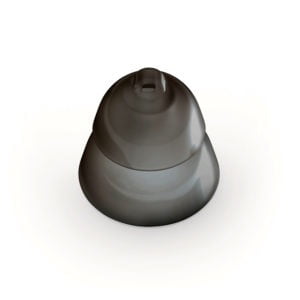Hearing aid batteries are the lifeblood of your hearing devices, ensuring they function optimally and provide you with the clarity and sound quality you need. With various types of batteries available, each offering different benefits and challenges, it’s essential to choose the right one for your hearing aids. In this comprehensive guide, we will explore everything you need to know about hearing aid batteries, from the different types and how to choose the best one, to tips on maximising battery life, proper maintenance, and troubleshooting common issues.
Whether you’re new to using hearing aids or looking to improve your current battery maintenance routine, this guide is designed to help you make informed decisions and keep your hearing aids performing at their best. Let’s dive in and discover how you can ensure your hearing aids stay powered and effective, every day.
In This Article:
- - Types of Hearing Aid Batteries
- - Choosing the Right Hearing Aid Battery
- - Tips from Audiologists and Hearing Care Professionals
- - How Long Should Hearing Aid Batteries Last?
- - How to Replace Hearing Aid Batteries
- - Maintaining and Storing Hearing Aid Batteries
- - Troubleshooting Battery Issues
- - Conclusion
Types of Hearing Aid Batteries
1) Zinc-Air Batteries
Zinc-air batteries are the most commonly used type of hearing aid battery. They work by utilizing air as an energy source. These batteries have tiny holes on the back that, when activated by removing the sticker, allow air to enter and react with the zinc inside the battery. This reaction generates power, providing a reliable and consistent energy source for hearing aids.
2) Common Sizes
Zinc-air batteries come in various sizes, typically indicated by a number and a corresponding colour code for easy identification:
- Size 10 (Yellow)
- Size 13 (Orange)
- Size 312 (Brown)
- Size 675 (Blue)
Each size is designed for different types of hearing aids, with larger batteries generally offering longer battery life.
3) Rechargeable Batteries
- Rechargeable batteries are becoming increasingly popular due to their convenience and environmental benefits. The two main types of rechargeable batteries used in hearing aids are lithium-ion and silver-zinc.
- Lithium-Ion Batteries: Known for their long battery life and fast charging times. These batteries are integrated into the hearing aid and typically last the lifetime of the device, reducing the need for frequent battery changes.
- Silver-Zinc Batteries: Offer similar benefits to lithium-ion but are removable and replaceable. They provide a reliable power source and can be recharged hundreds of times.
4) Pros and Cons of Rechargeable vs. Disposable Batteries
Pros:
- Environmentally friendly, reducing waste from disposable batteries.
- Convenient, as they eliminate the need for regular battery replacements.
- Cost-effective in the long run despite a higher initial investment.
Cons:
- Higher upfront cost for rechargeable hearing aids.
- Requires regular access to a power source for recharging.
- Limited lifespan of the rechargeable battery compared to disposables that can be replaced as needed.
In summary, choosing the right type of hearing aid battery depends on your specific needs and lifestyle. Zinc-air batteries are reliable and widely used, while rechargeable options offer convenience and environmental benefits. Understanding these differences can help you make an informed decision to keep your hearing aids running smoothly.
Choosing the Right Hearing Aid Battery
1) Factors to Consider
- Hearing Aid Model Compatibility: One of the most important factors in choosing the right hearing aid battery is ensuring it is compatible with your hearing aid model. Each hearing aid is designed to work with specific battery types and sizes, so always check your hearing aid’s manual or consult with your audiologist to confirm the correct battery type.
- Battery Size: The size of the battery is crucial for both performance and convenience. Hearing aid batteries come in different sizes, and each size has a different lifespan. Common sizes include 10, 13, 312, and 675. Larger batteries generally offer longer life but might not be suitable for smaller, more discreet hearing aids.
- User Lifestyle and Preferences: Consider how often you use your hearing aids and in what environments. If you lead an active lifestyle or frequently engage in outdoor activities, you might prefer rechargeable batteries for their convenience. On the other hand, if you prefer minimal maintenance, disposable zinc-air batteries might be more suitable.
2) Battery Size Chart
Having a visual chart can help in quickly identifying the right battery for your hearing aid. Here’s a simple color-coded chart for reference:
- Size 10 (Yellow): Used in Mini RIC (Receiver-in-Canal) hearing aids
- Size 13 (Orange): Used in BTE (Behind-the-Ear) hearing aids
- Size 312 (Brown): Used in Mini BTE, RIC, ITE (In-the-Ear) hearing aids
- Size 675 (Blue): Used in BTE hearing aids with high power
Tips from Audiologists and Hearing Care Professionals
1) Regular Check-Ups:
Schedule regular check-ups with your audiologist to ensure your hearing aids are functioning optimally. They can provide specific recommendations based on your hearing needs and lifestyle.
2) Store Batteries Properly:
Keep your batteries in their original packaging until you’re ready to use them. Store them in a cool, dry place to prevent them from draining prematurely.
3) Carry Spares:
Always carry spare batteries with you, especially if you are using disposable ones. This ensures you’re never caught off guard if your current batteries run out.
4) Monitor Performance:
Pay attention to the performance of your hearing aids. If you notice a drop in sound quality or shorter battery life, it might be time to replace the batteries or check for other issues.
How Long Should Hearing Aid Batteries Last?
The lifespan of hearing aid batteries varies depending on the type and size of the battery:
1) Zinc-Air Batteries
- Size 10: Typically lasts between 3-7 days.
- Size 13: Generally lasts between 6-14 days.
- Size 312: Often lasts between 3-10 days.
- Size 675: Can last between 9-20 days.
2) Rechargeable Batteries
- Lithium-Ion: Usually lasts 19-24 hours on a full charge.
- Silver-Zinc: Typically lasts around 24 hours per charge but may require replacement every year or two.
3) Factors Affecting Battery Life
- Daily Use: The more you use your hearing aids, the quicker the batteries will drain. Continuous use of features like wireless streaming can also reduce battery life.
- Hearing Aid Settings: High-volume settings, noise reduction, and other advanced features can consume more power.
- Humidity: High humidity can shorten battery life as it can cause batteries to swell and leak.
- Temperature: Extreme temperatures can affect battery performance. Cold weather can slow down the chemical reactions inside the battery, while high temperatures can cause batteries to drain faster.
- Advanced Features: Features such as Bluetooth connectivity, noise reduction, and feedback management require more power and can reduce battery life.
- Volume Levels: Higher volume settings use more power, which can reduce the lifespan of your batteries.
4) Best Practices for Extending Battery Life
- Turn Off When Not in Use: Turn off your hearing aids when you’re not using them to save battery life. Opening the battery door at night can also help reduce power drain and allow moisture to escape.
- Use the Battery Until It’s Dead: Avoid changing the battery until it is completely dead to get the maximum use out of each battery.
- Remove Tabs Only When Ready to Use: For zinc-air batteries, remove the protective tab only when you’re ready to use them. Once the tab is removed, air activates the battery, and it starts to drain.
5) Storage Tips
- Keep Batteries Dry and Cool: Store your batteries in a cool, dry place. Avoid storing them in the bathroom or kitchen where humidity levels can be high.
- Avoid Metal Contact: Keep batteries away from metal objects such as keys and coins, which can short-circuit them.
- Use a Hearing Aid Dehumidifier: If you live in a humid environment, using a hearing aid dehumidifier can help keep your hearing aids and batteries dry.
By understanding the factors that affect battery life and following these best practices, you can ensure that your hearing aid batteries perform optimally and last as long as possible.
How to Replace Hearing Aid Batteries
Replacing your hearing aid batteries is a simple process that can be done at home. Follow these steps to ensure you do it correctly:
1) Gather Your Materials
- New hearing aid batteries
- Hearing aid cleaning brush (if needed)
- Tissues or a soft cloth
2) Remove the Old Battery
Open the battery compartment gently using your fingernail or a small tool designed for this purpose. Tilt the hearing aid so the old battery falls out. You may need to gently tap the hearing aid if the battery is stuck. If there’s any residue or debris inside the battery compartment, use a small brush or a dry cloth to clean it.
3) Prepare the New Battery
Remove the new battery from its packaging. Peel off the protective tab from the zinc-air battery. Wait for a few minutes before inserting it to allow the battery to activate.
4) Insert the New Battery
Place the new battery into the compartment with the “+” sign facing up. Most batteries will have this sign clearly marked. Ensure the battery is securely seated in the compartment.
5) Close the Battery Compartment
Gently close the battery compartment. Make sure it clicks into place and is fully closed. If it doesn’t close easily, don’t force it. Check to ensure the battery is seated correctly.
6) Test the Hearing Aid
Turn on your hearing aid to make sure it’s working properly. If you don’t hear any sound, double-check the battery placement and ensure the battery is new and properly activated.
For further instructions, check out our blog on changing hearing aid batteries.
7) Common Mistakes to Avoid
To keep your hearing aids functioning optimally, avoid these common mistakes when replacing batteries:
- Touching the Battery Surface: Try not to touch the flat surfaces of the battery. Oils and dirt from your fingers can reduce the battery’s lifespan.
- Forcing the Battery Compartment: Never force the battery compartment closed. If it doesn’t close easily, recheck the battery placement. Forcing it can damage the hearing aid.
- Mixing Old and New Batteries: Always replace old batteries with new ones from the same package. Mixing batteries of different ages can cause leakage and reduce performance.
- Storing Batteries Incorrectly: Store batteries at room temperature and avoid keeping them in the refrigerator or exposing them to extreme temperatures.
- Using Expired Batteries: Check the expiration date on the battery packaging. Using expired batteries can lead to poor performance and leakage.
Maintaining and Storing Hearing Aid Batteries
1) Cleaning and Maintenance
Proper maintenance of your hearing aid batteries is crucial for optimal performance and longevity. Here’s how to keep them clean:
- Regular Cleaning: Clean the battery contacts in your hearing aid regularly. Use a dry, soft cloth to wipe away any dust or debris that may have accumulated. Avoid using water or cleaning solutions as these can damage the electronics.
- Inspect the Battery Compartment: Check the battery compartment for any signs of corrosion or dirt. If you notice any buildup, gently clean it with a dry cotton swab or a hearing aid cleaning brush.
- Handle with Care: Always handle batteries with clean, dry hands. Oils and moisture from your fingers can transfer to the batteries, potentially affecting their performance.
2) Proper Storage
Proper storage of hearing aid batteries can significantly extend their lifespan:
- Room Temperature: Store your batteries at room temperature. Extreme temperatures, both hot and cold, can reduce battery life and effectiveness.
- Avoid Refrigeration: Do not refrigerate your batteries. While some people believe this extends battery life, it can actually cause condensation and damage the batteries.
- Original Packaging: Keep batteries in their original packaging until you’re ready to use them. This helps prevent them from short-circuiting and losing charge.
- No Metal Contact: Store batteries away from metal objects such as keys, coins, or other batteries. Metal objects can short-circuit the batteries and drain their power.
3) Travel Tips
When traveling, it’s important to ensure your hearing aids and batteries are well-protected:
- Carry Extra Batteries: Always bring extra batteries with you when traveling. Changes in environment and usage patterns can cause your batteries to drain faster than usual.
- Protective Case: Use a protective case to carry your batteries. This prevents them from coming into contact with metal objects and short-circuiting.
- Avoid Direct Sunlight: Keep your batteries and hearing aids out of direct sunlight. Excessive heat can damage both the batteries and the devices.
- Moisture Protection: If you’re traveling to a humid climate, consider using a dehumidifier or drying kit for your hearing aids to protect them from moisture damage.
By following these cleaning, storage, and travel tips, you can ensure that your hearing aid batteries remain in excellent condition, providing you with reliable and long-lasting performance.
Troubleshooting Battery Issues
Even with proper care, you may encounter some issues with your hearing aid batteries. Here are some common problems and their solutions:
1) Battery Drain
- Check for Corrosion: Inspect the battery contacts and compartment for any signs of corrosion or debris. Clean them gently with a dry cotton swab.
- Avoid High Drain Features: Turn off high-drain features like wireless streaming when not in use to conserve battery life.
- Store Batteries Properly: Ensure batteries are stored at room temperature and away from metal objects to prevent short-circuiting.
2) Hearing Aid Not Powering On
- Check the Battery Orientation: Make sure the battery is inserted correctly with the positive (+) side facing up.
- Inspect the Battery: Ensure the battery is fresh and hasn’t been depleted. Use a battery tester if necessary.
- Clean the Contacts: Clean the battery contacts in the hearing aid and on the battery itself to ensure a good connection.
- Check the Battery Door: Ensure the battery door is closing properly and making full contact with the battery.
3) When to See a Professional
Sometimes, despite your best efforts, you may need expert assistance. Here are some signs that it’s time to consult a hearing care professional:
- Persistent Issues: If you’re experiencing consistent problems with your hearing aid batteries, such as rapid drainage or the device not powering on, it’s best to seek professional help.
- Physical Damage: If you notice any physical damage to the hearing aid or battery compartment, it’s important to have it checked by a professional to avoid further complications.
- Performance Issues: If your hearing aid is not performing as expected even with fresh batteries, a professional can conduct a thorough examination and pinpoint the issue.
- Advanced Troubleshooting: If you’ve tried all the basic troubleshooting steps and the problem persists, a professional has the tools and expertise to diagnose and fix more complex issues.
Remember, regular maintenance and professional check-ups are key to keeping your hearing aids in optimal working condition. If you encounter any persistent issues, don’t hesitate to reach out for expert help to ensure your hearing aids are functioning properly and effectively.
Conclusion
Maintaining your hearing aids and their batteries is crucial for ensuring optimal performance and extending the lifespan of your devices. From understanding the different types of batteries and their lifespans to proper maintenance and troubleshooting tips, this guide covers everything you need to keep your hearing aids functioning smoothly.
At Hearing Aid Accessories, we offer a wide range of high-quality hearing aid batteries, including NHS hearing aid batteries, from major manufacturers such as Rayovac. Additionally, if you’ve opted for rechargeable hearing aids, explore our variety of quality chargers compatible with various hearing aid brands.
Ready to find the perfect batteries and accessories for your hearing aids? Click the button below to browse our extensive range and ensure your hearing aids are always ready to perform at their best.




